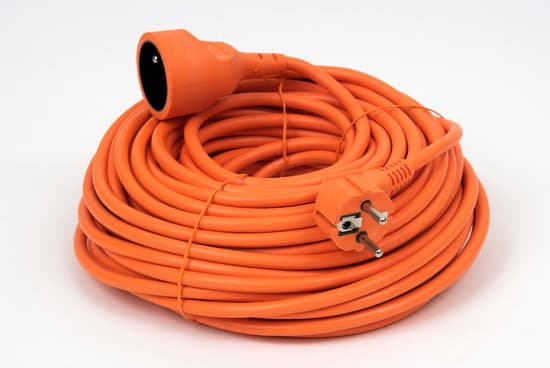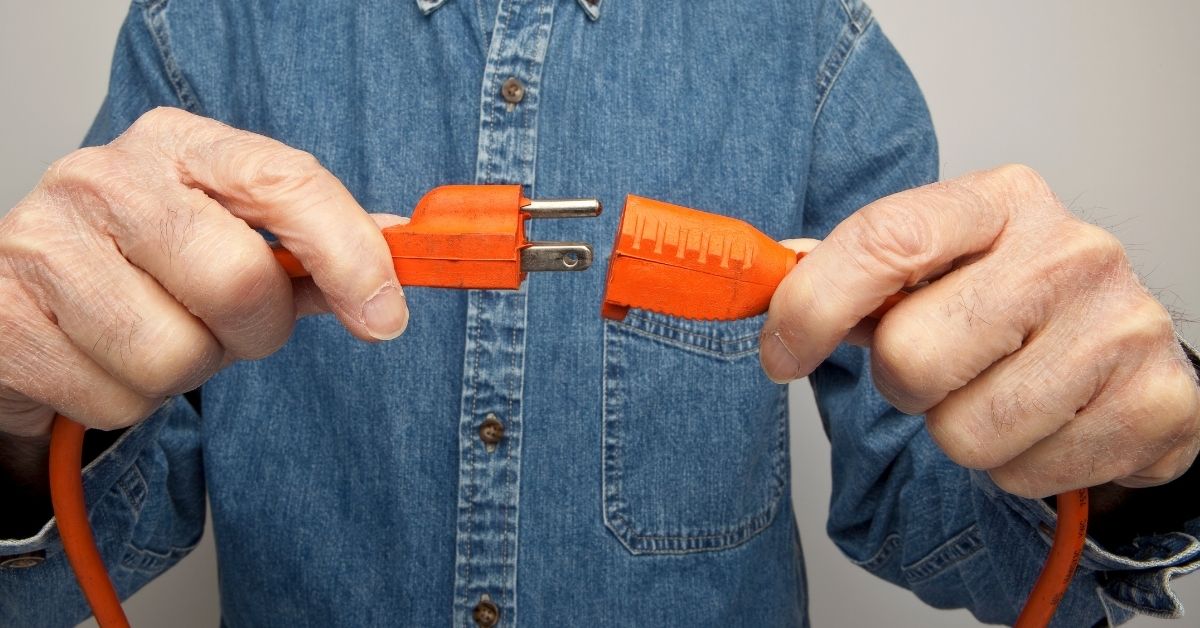When it comes to purchasing extension cords, you have to ensure that the extension cord volt rating matches the needs of the appliances you want to operate. You can find extension cords in various ratings. To identify the right one for your situation, you must first understand the attributes surrounding each option.
220/230/240/250 Volt Extension Cord
Because 220/240 is the standard power system in Europe and various countries outside North and South America, you are more likely to find 220/230/240/250v extension cords in countries outside North and South America.
Many people in the United States have never seen a 220v extension cord. Or at the very least, they have never purchased one from a store. Whenever they come across extension cord volt ratings in this range, they are normally custom-made. Though, they are not necessarily impossible to find.
1). Its Uses
220-250v extension cords are meant for heavy-duty purposes. You can pair them with items that use a lot of power such as water heaters and electric vehicle chargers. They have thicker cords and they typically come in higher gauges.
Because they have a greater capacity, you can safely use them to run table saws, air compressors, and the like. They are perfect for tools that are located long distances from a wall outlet, which is why you are more likely to find them in workshops, at construction sites, and in the homes of hobbyists that do woodwork, metalwork, and the like.
Many professionals expect you to use extension cords that were specifically designed for the power tools you want to operate. In other words, rather than buying a random 250v extension cord for your table saw, you should buy an extension cord that was designed for table saws. Such an extension cord is less likely to overload because it has the right gauge for your power tools.
2). How Long Can A 220/240 Volt Extension Cord Be?
220v extension cord can be as long as 100feet. The 240v extension cord of a 2200w jackhammer can be 30-60 meters. But in many cases, the length is determined by the gauge. The longer the cord, the lower its carrying capacity.
So if you want a longer cord but you don’t want to compromise the carrying capacity, you have to get the highest possible gauge.
The higher the gauge, the greater the carrying capacity, the smaller the amount of voltage dropped as a result of an increase in the length.
3). What Devices Can You Use Ranging From 220-250v?
You can use appliances that fit within the 220-240 volt range, including garbage disposals, freezers, dishwashers, microwave ovens, and rice cookers.
220-Electronics has a catalogue of appliances that fit within the 220-240 volt range. Mr. Electric has also mentioned electric car level 2 chargers and cooktops.
4). Pros and Cons
The only significant disadvantage of 220-250v is the fact that it is more dangerous than 110v. The increase in voltage means that you are more likely to die. This is why 220-240v lines require more insulation. The goal is to safeguard against breakdown because 220-240v lines are more lethal.
On the other side of the equation, 220-250v extension cords can operate powerful devices like ovens and dryers that require a lot of power. 220-240v lines are more efficient because they use thinner wires to carry the same amount of power.
110/115/120v Extension Cord
The US is not the only country that uses 110/120v. You will find similar power systems in places like Canada, Mexico, and the Bahamas.

However, the US is the most popular of all these places. This is why a lot of people think that the US uses 110/120v when the rest of the world has chosen to prioritize 240v. That is not the case. There are several countries besides the US that have 110/120v power systems
1). Its Uses
If you want to travel from a place that uses 110v to a place that uses 220v, you should match the extension cord to the power supply. That is to say, you should use 110v extension cords in countries that have a 110v power supply.
This is because the extension cord volt rating will determine whether or not you can even plug that extension cord into an outlet. 110/120v outlets do not have the same configuration as 220/240v outlets. A plug that works in 220v outlets will not enter a 110v outlet. The reverse is also true.
Keep that in mind before you take a 110v extension cord to a country that uses 220v. While 220/240v extension cords are meant for use with heavy-duty items, 110v extension cords will work with everything else.
You can use them for basic household purposes such as charging your phone, watching television, listening to the radio, etc. It wouldn’t be inaccurate to categorize these extension cords as ‘Light-Duty’ and ‘Medium-Duty’.
Though, in most cases, those categories are determined by the gauge. You are less likely to find a 110v extension cord in a workshop. They are common in residential settings.
2). What Devices Can You Use Ranging From 110-120v?
Most household appliances are compatible with 120v outlets, which means that you can use a 110/120v extension cord to operate those same appliances. You can add laptops, digital radios, digital cameras, and mobile phones to that list.
Though, you can also find freezers, dishwashers, microwaves, and other seemingly heavy-duty kitchen appliances that have 110/120v ratings. The labels of the appliances in your home will tell you whether you need a 110/120v or a 220/240v extension cord.
3). Pros and Cons
110/120v products are more attractive to some people because they are safer. They can still electrocute you but they will hurt less. You are also less likely to die. For that reason, 110v lines require less insulation.
Though, a professional electrician will argue that 110v lines are associated with thicker cables that utilize more copper. This is because the lower voltage requires thicker cables to accommodate the higher current.
You should also note that 120v extension cords cannot operate power tools like table saws, at least not safely. In most cases, you have to limit them to simple household applications.
12 Volt Extension Cord
12v extension cords are rarely mentioned in discussions regarding extension cord voltage ratings. This is because they are normally used in cars. They do not serve any purpose within a residential setting.
For that reason, if you don’t have a car, or if you have one but you have never used it to charge your devices, you have probably never seen or heard of a 12v extension cord.
1). Its Uses
If you have seen the 12v extension cord, you can probably tell how it works even though you have never used one. It has a section that is clearly designed to enter the cigarette lighter outlet of a car.
Most 12v extension cords have a similar design. According to Lifewire, a vehicle’s electrical system produces 12V DC. Therefore, you can use a 12v extension cord to charge or power certain devices by connecting them to a car’s electrical system.
Devices that can run on a 12v system include DVD players, MP3 Players, smartphones, tablets, laptops, and GPS Units, to mention but a few. Some of these electronic devices are sold with special adapters that you can use to connect them to your vehicle.
In other words, you do not require a separate 12v extension cord. Others will not work unless you pair them with a car power inverter. You should check the manual to determine whether or not your device can work directly with a 12v extension cord.
2). Pros and Cons
12v extension cords are popular among car owners because you can use them to charge and operate mobile devices like tablets and phones when you are on the road. They are common in RVs.
Most vehicles (including RVs) can use 12v extension cords. This makes them easier and more convenient. Though, if you have an RV and you are trying to choose between 12 and 24v, you should know that 24v works better with AC appliances.
480-600 Volt Extension Cord
Some people call these devices portable cords or flexible cords. Flexible cords are used in a variety of applications, both large and small. If your target is an extension cord voltage of 480-600v, you are probably working with large tools.
1). Its Uses
Extension cords with this kind of cable have multiple conductors. You are supposed to use them in applications that require temporary electrical power connections in areas where flexibility is essential.
People use 480-600v cords in applications that need cables with a decent amount of oil, chemical, and abrasion resistance. They are suitable for approved raceways, conduits, cranes, and hoists, to mention but a few.
2). Pros and Cons
480-600v are attractive because of their heightened resistance to destructive elements like heat, cold, oil, abrasion, and chemicals.
They require thicker insulation, which is a good thing. However, that will also affect the price. In other words, you can expect to spend more on 600v extension cords than you would on their 300v counterparts.
Do Extension Cords Have Voltage?
Extension cords have a voltage that is determined by their gauge. The higher the gauge, the greater the carrying capacity, the smaller the amount of voltage dropped as a result of an increase in the length. Some commonly used extension cord volt are 110,120,210,220v extension cord.
Does Voltage Matter For Extension Cords?
Voltage matters for extension cords because voltage tells you that whether you can use heavy or light duty electrical items. 220-240v extension cords are meant for use with heavy-duty items, While 110v extension cords will work with charging your phone, watching television, listening to the radio, etc.
How Do I Know What Voltage My Extension Cord Is?
You can determine the voltage of your extension cord which is printed in the outer insulation of the cord. Always use the extension cord that matches the needs of the appliances you want to operate.
How Many Volts Can An Extension Cord Handle?
An extension cord can handle different voltages ranging from 12v to 600 volts. 12v is used in cars. 110-120v are used in American countries to use household items. 220-600v are used to use heavy-duty items.
Related Post:

